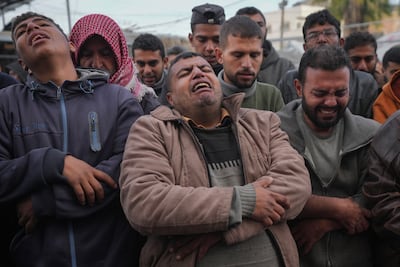Live updates: Follow the latest on Israel-Gaza
Mohammed Sinwar, widely believed to be the de facto commander of Hamas's military wing, had for years looked up to his older brother Yahya, the Hamas leader who was killed in Gaza in October.
Little is known about the younger Sinwar, with the 50-year-old, Gaza-born militant choosing a life in the shadows, guided by an uncompromising perception of Israel as the enemy.
“We know how to identify the spots in the occupation [Israel] that can cause maximum pain,” he said in an interview with Al Jazeera broadcast two years ago.
“The resistance has been able to establish important formulas in its confrontation with the occupation and how to pressure them,” said Mr Sinwar, whose face was in shadow during the interview. “Thanks be to God … the enemy now is deeply alarmed by that.”
Nicknamed Al Thel – Arabic for the shadow – in Gaza, Mr Sinwar is far more radical than his late brother, himself long viewed as such, sources said. The little that is known about him paints a picture of a man who has devoted his life to defeating Israel.

The sources said it was Israel's misfortune that Mr Sinwar was in charge of the estimated 100 Israeli and other hostages still being held out of about 250 abducted during the attack on southern Israel on October 7, 2023, by Hamas and other militant groups that killed 1,200 people and sparked the war in Gaza.
Negotiations mediated by the US, Egypt and Qatar have failed to produce any pause in fighting since a week-long truce at the end of November 2023. Then, Hamas freed about 100 hostages in exchange for the release of several hundred Israeli-held Palestinian detainees.
Talks in recent weeks on an extended ceasefire, hingeing on a similar exchange, have been energised by Donald Trump's US presidential election win and his pledge that there will be “hell to pay” if the hostages are not freed before his inauguration on January 20. The hostages, about 40 of whom are believed by Israel's military to have died in captivity, are effectively the only bargaining chip held by Hamas after 15 months of an Israeli military offensive in Gaza.
“I want a deal that fully compensates for the blood of all of our martyrs,” the sources quoted Mr Sinwar as saying in a recent note that reached the Egyptian and Qatari mediators through intermediaries.
That kind of deal might be a tall order given that Israel's offensive has left Hamas's military capabilities in tatters, killed more than 45,800 Palestinians and injured more than twice that number, the enclave's Health Ministry estimates.

But the sources said Mr Sinwar may believe Hamas has little to lose if it continues to hold off for the best deal possible. “Mohammed Sinwar's positions are behind most if not all the deadlocks in the negotiations since his brother died in October,” one source said. “He is known to be more radical than the older Sinwar, maybe because he has only known combat and hardly involved himself in politics.
“He is more security conscious than his brother now that everyone knows that Israel has its spies everywhere. He has had little if any dealings with civilians in Gaza.”
Mr Sinwar joined Hamas in the 1990s and had served several prison sentences in Israel and in jails belonging to the Palestinian Authority, in the occupied West Bank. He survived at least six assassination attempts by Israel and took part in an attack on Israel in June 2006 that ended with the capture of an Israeli soldier, Gilad Shalit.
A deal in 2011 resulted in Hamas exchanging Mr Shalit for more than 1,000 Palestinians imprisoned in Israel, including his brother Yahya. The younger Sinwar is credited with playing a leading behind-the-scenes role in the Egyptian-brokered negotiations that led to the swap, the sources said.

Both Sinwar brothers started out in Hamas's military wing, Ezzedine Al Qassam Brigades. But while Yahya rose quickly through the ranks to become the group's leader in Gaza and then its overall supremo three months before his death, his younger brother almost fell from the public eye shortly after he joined the military wing.
He has been so concerned with his personal security, according to reports, that he stayed away from his father's funeral in 2022 in case he was recognised by the public.
He and his older brother, however, have commemorated their father's name by giving themselves the alias Abu Ibrahim, using their father's first name rather than that of their firstborn male child as is customary among many Arab men.
A year ago, the Israeli military released a video clip purporting to show Mr Sinwar in the front passenger seat of a car moving through an underground tunnel in northern Gaza. The man in the clip looked to be in his forties, wearing a checked shirt. The authenticity of that video was never verified independently.
The younger Sinwar has for years been in charge of the rocket units that frequently showered Israel with projectiles, the sources said. He has also been the commander of the Southern Battalion based in Khan Younis, an outfit that was reputed to be Hamas's strongest and most battle-hardened, they said.
It is not clear, however, whether Mr Sinwar is now the commander of the entire military wing of Hamas. Mohammed Deif, who retains that title, was reported by Israel to have been killed in July but Hamas denies his death.
The sources said Mr Deif has been significantly incapacitated by injuries he had suffered in at least seven assassination attempts by Israel but kept his title as Ezzedine Al Qassam Brigades commander in recognition of his service, while Mr Sinwar is the actual commander.


